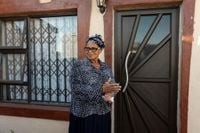In a significant development for South Africa's economy, renowned economist Dawie Roodt has revealed that the state collected nearly R10 billion more in taxes than anticipated. This unexpected surplus raises questions about the necessity of a proposed increase in the value-added tax (VAT) by 0.5 percentage points, set to take effect on May 1, 2025. Roodt shared his insights during a recent Biznews interview amidst ongoing legal battles over the VAT hike.
On April 22, 2025, South Africa's High Court heard an application filed by the Democratic Alliance (DA) and the Economic Freedom Fighters (EFF) seeking to halt the VAT increase. The court has reserved judgment and is expected to deliver its ruling by April 29, 2025. The outcome of this case could have significant implications for the country's fiscal policy.
DA finance spokesman Mark Burke expressed strong opposition to the VAT hike, arguing that it would exacerbate economic hardships for South Africans. "We oppose a bullying budget that will lead to more young people losing hope when they realize they will be poorer than their parents," Burke stated. He further emphasized concerns about the declining value of homes, noting, "We oppose a bleeding budget that will lead to more South Africans wondering why their house value has gone down for another year in a row." Burke's comments reflect broader anxieties about the impact of increased taxation on the already strained finances of many households.
In contrast, Finance Minister Enoch Godongwana has warned that scrapping the VAT hike could create a budget shortfall that would necessitate increased borrowing. This, he argues, would undermine fiscal discipline and impose a long-term cost on the nation's finances. Godongwana sees no viable alternative to the proposed increase, stating that it is essential for maintaining the government's budgetary integrity.
However, Roodt challenges this perspective, pointing to the South African Revenue Service (SARS), which reported a positive preliminary revenue-collection outcome for the 2024/25 fiscal year. By the end of March 2025, SARS had collected a gross amount of R2.303 trillion, reflecting a year-on-year growth of 6.9%. After accounting for refunds totaling R447.7 billion to taxpayers, the net collection stood at R1.855 trillion, which is nearly R8.8 billion higher than the revised estimate and R114.0 billion more than the previous year's total of R1.741 trillion.
Roodt noted, "Half a percentage point increase will raise around R10 billion. That means the state has the money. We don’t need to increase VAT. There was an overrun in the previous financial year, which is enough to prevent the planned VAT increase." His comments highlight a growing debate about fiscal responsibility and the government's approach to taxation.
In a separate but related economic update, Capitec Bank, one of South Africa's leading financial institutions, reported a remarkable 30% rise in annual profit. For the year ending February 28, 2025, the bank's headline earnings surged to 13.7 billion rand ($738.14 million), up from 10.6 billion rand the previous year. This growth is attributed to a significant increase in net interest income, which has been bolstered by the bank's focus on serving low-income earners.
Capitec's success underscores the resilience of certain sectors within the South African economy, even as discussions around taxation and fiscal policy continue to unfold. The bank's ability to thrive in a challenging economic environment may offer insights into potential pathways for broader economic recovery.
As South Africa grapples with the implications of its fiscal policy and the potential VAT increase, the outcomes of the ongoing legal proceedings and economic performance reports will likely shape the national discourse. Investors and citizens alike are watching closely, as the decisions made in the coming weeks could have lasting impacts on the country's financial landscape.
In conclusion, the debate over the VAT increase encapsulates broader concerns about economic stability and the government's role in addressing financial challenges faced by its citizens. With the High Court's ruling on the horizon and economic indicators suggesting a mix of resilience and uncertainty, South Africa stands at a crucial juncture.




